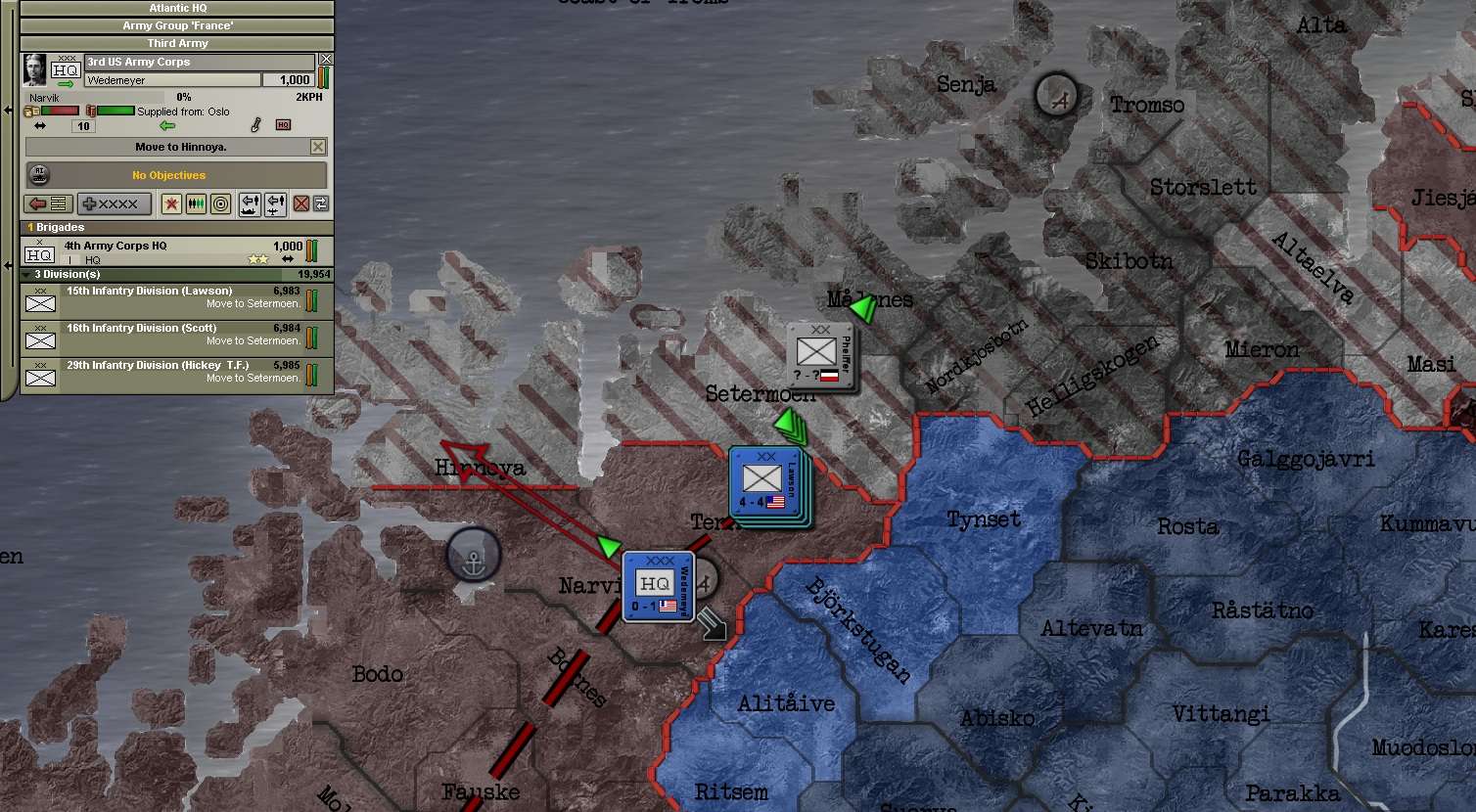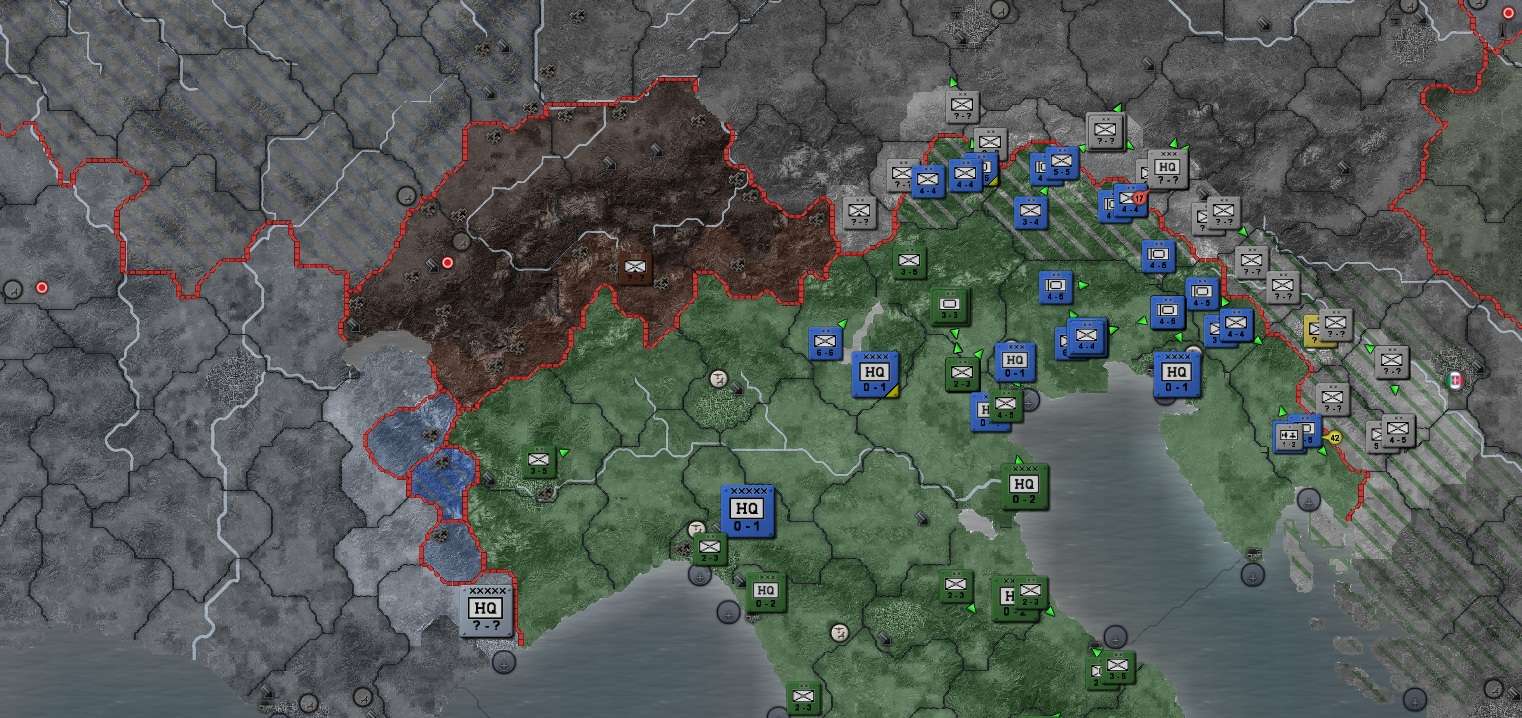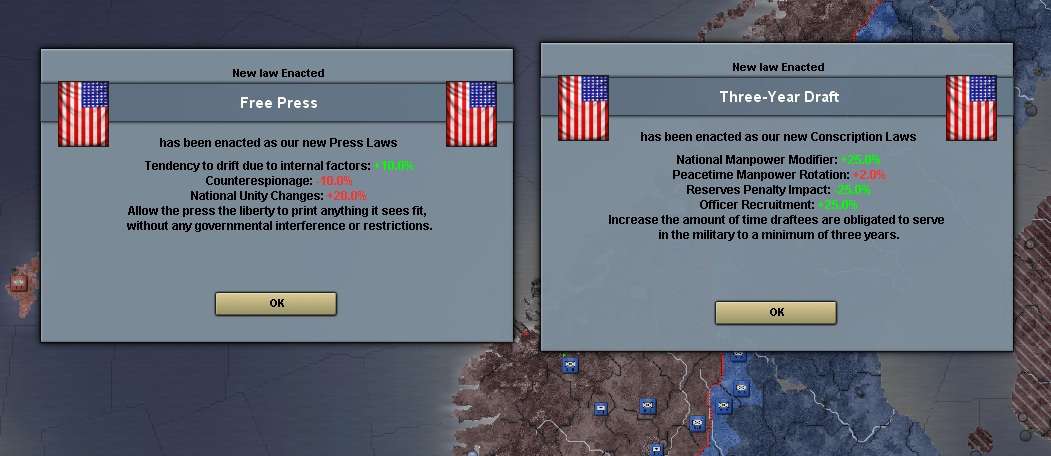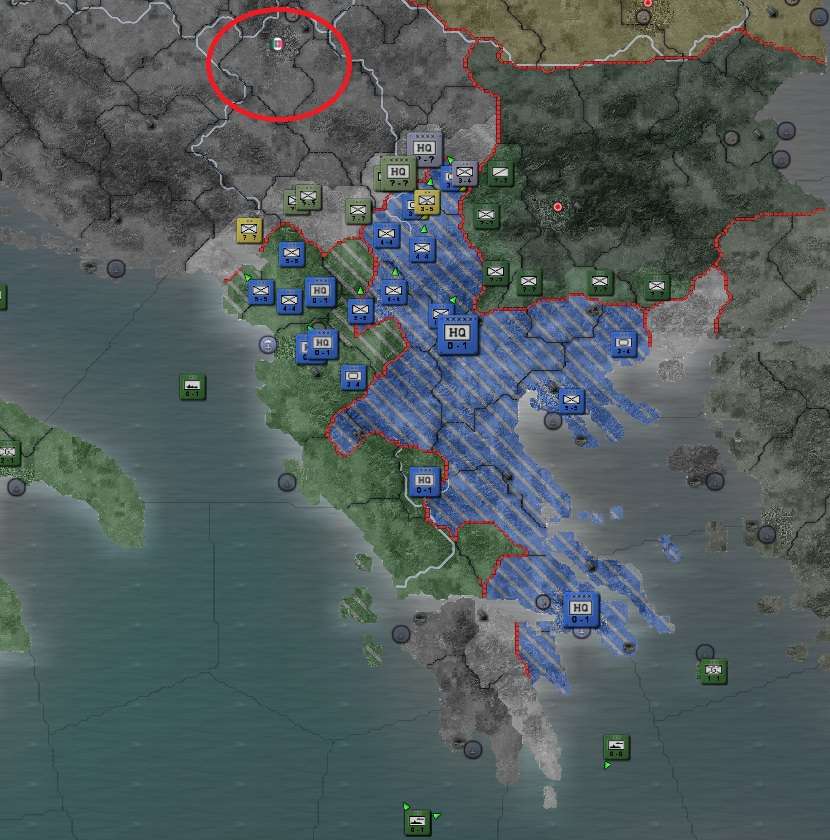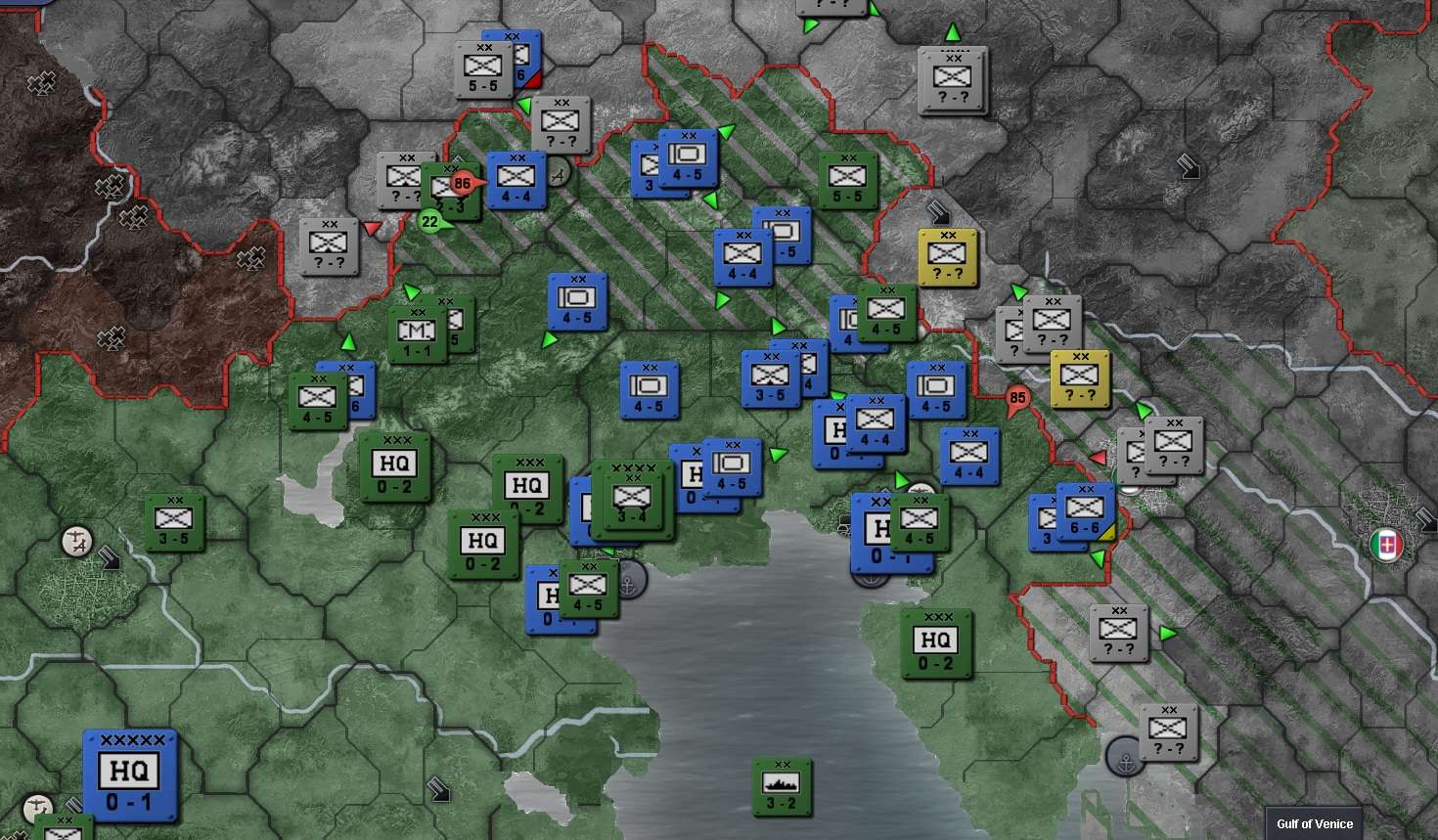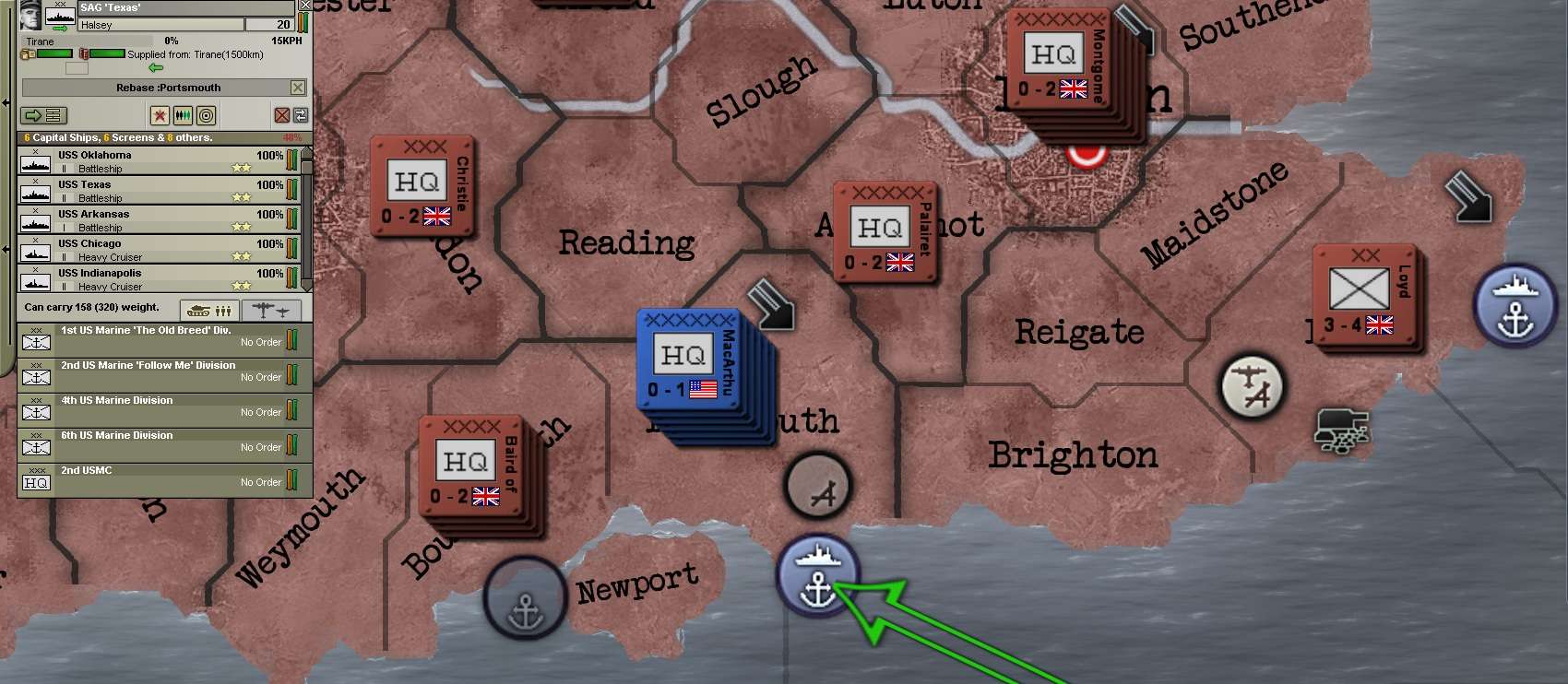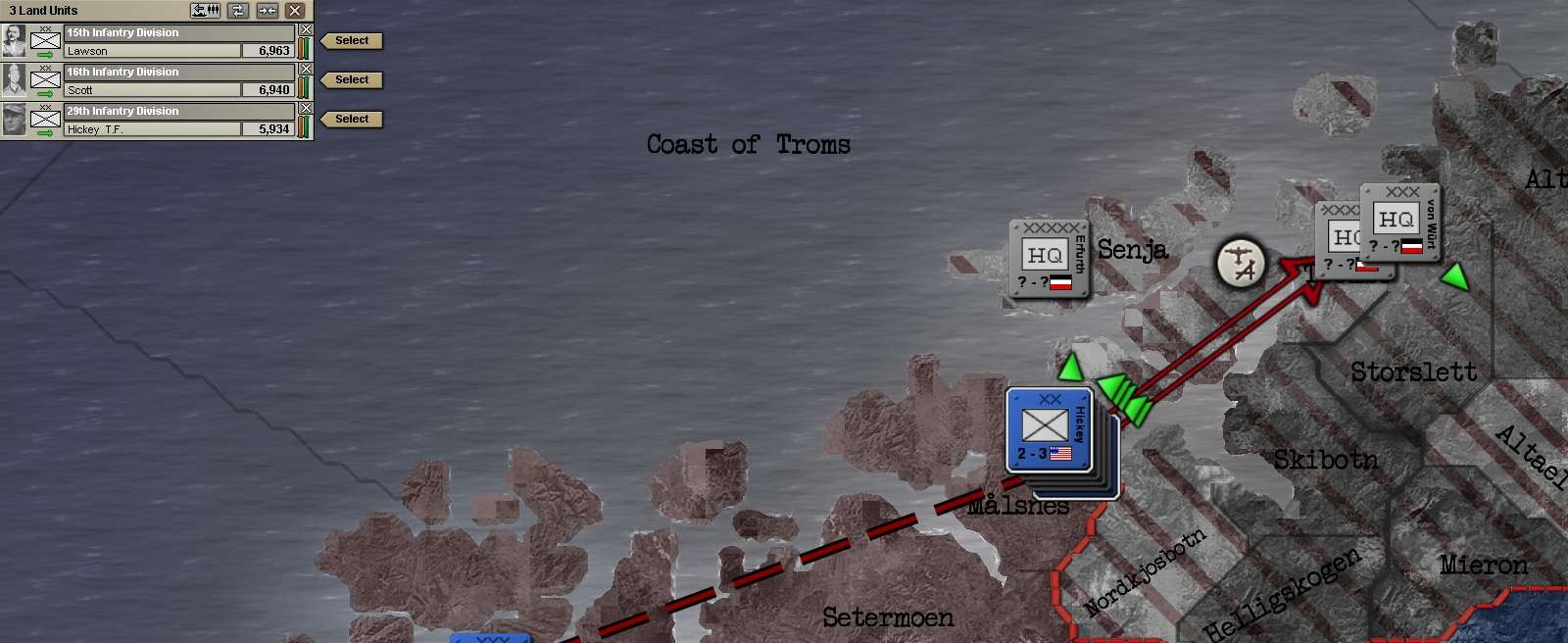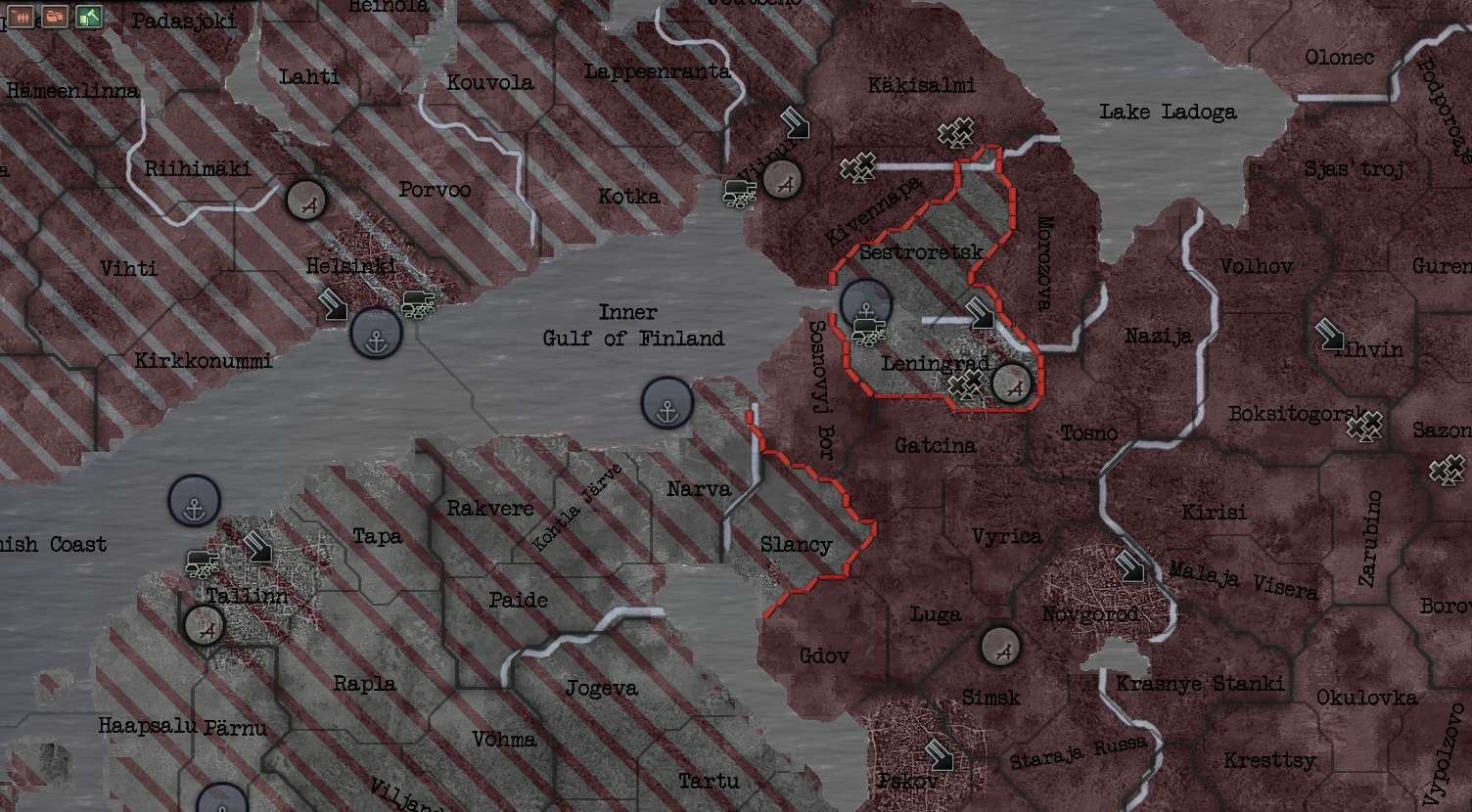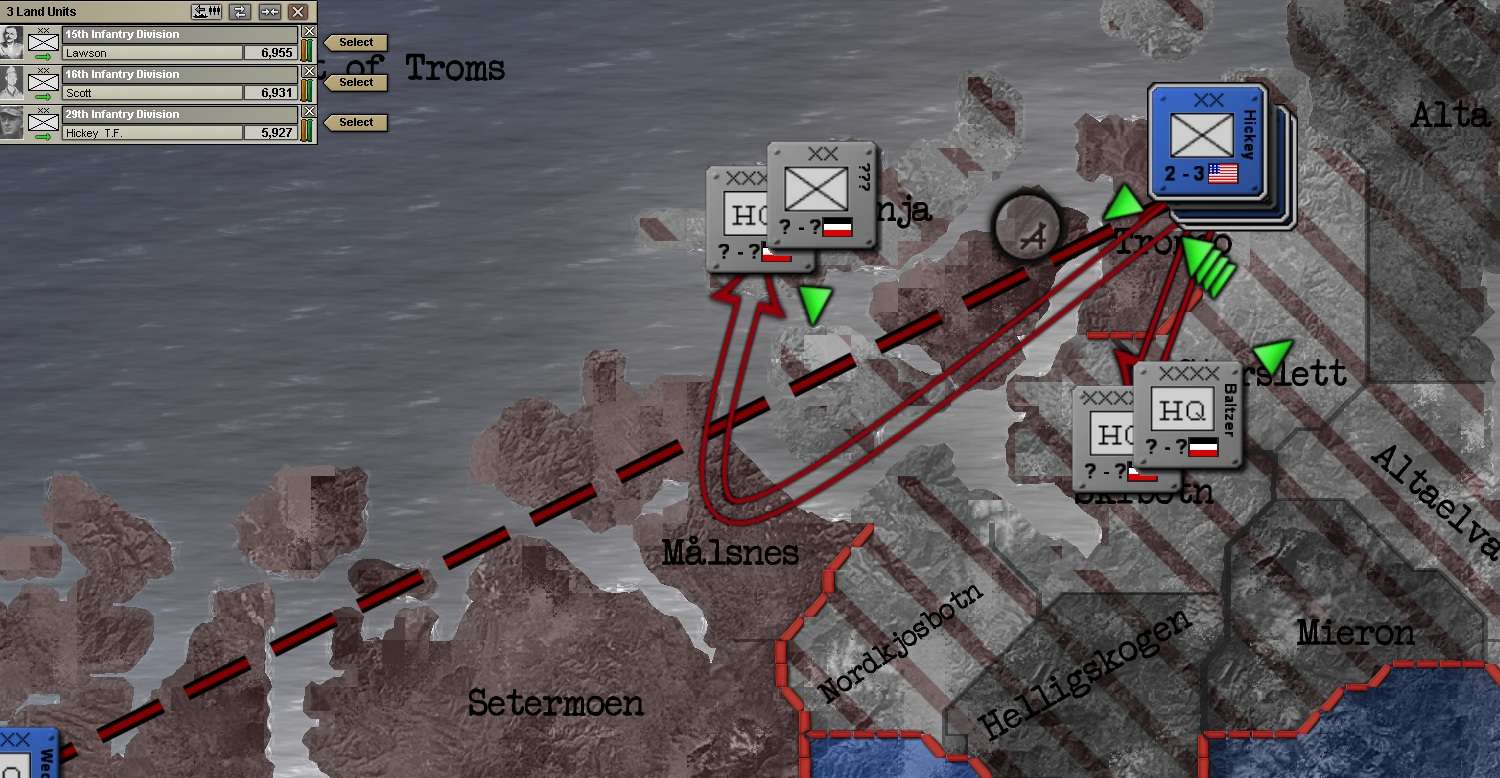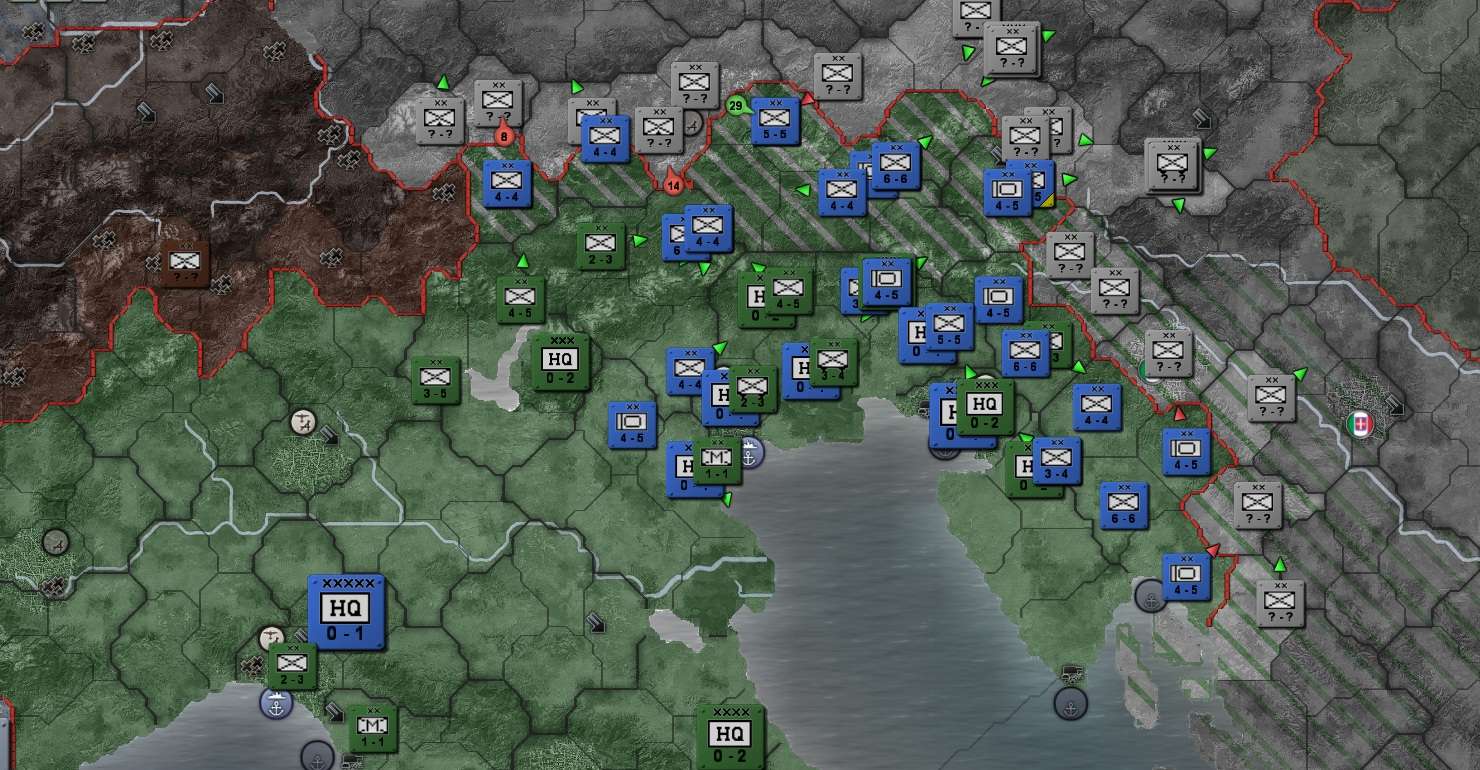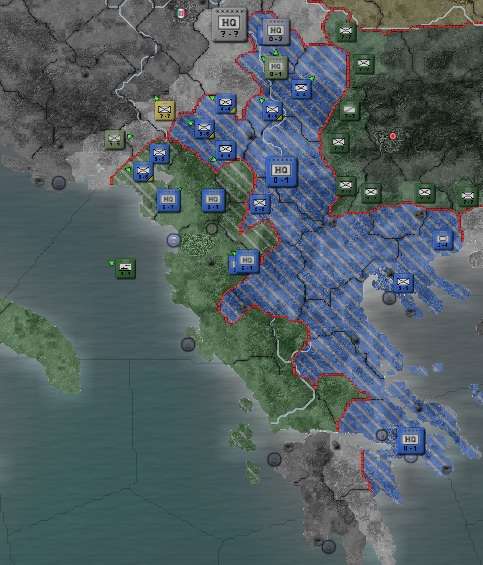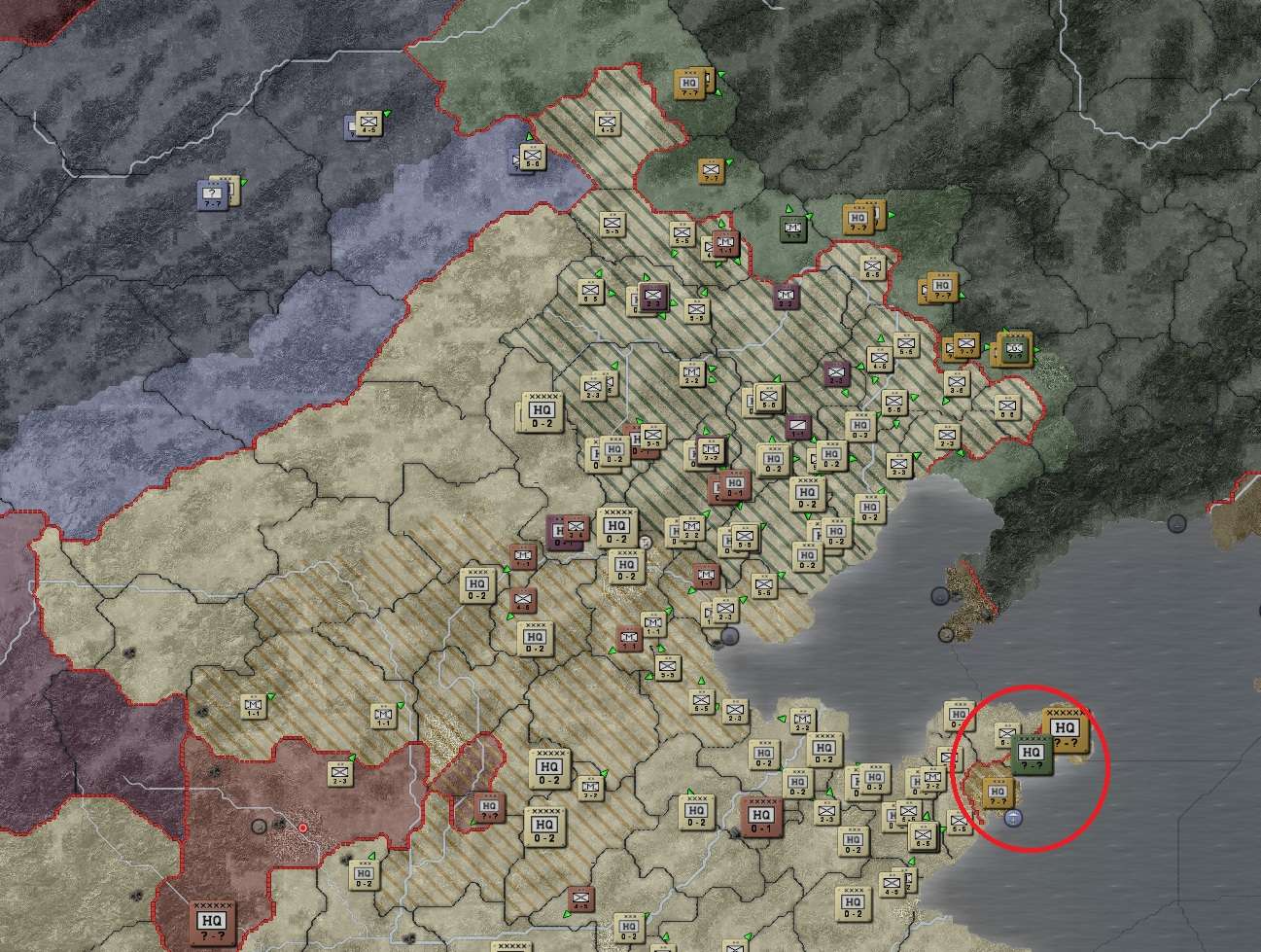Plans for Operation Hannibal
Operation Hannibal
The information contained in this briefing is classified Top Secret, and is protected by the provisions of the Espionage Act. Any transmission of this briefing to unauthorized parties will result in criminal prosecution per the provisions of that Act, which will result in a minimum of imprisonment for thirty (30) years, and may potentially include the death penalty should the court deem such punishment necessary.
Background: War Plan Gold
Situation Report
Currently, the European war is tipping in our favor. The success of our forces in defeatingthe Kingdom of Italy has opened Europe's soft underbelly to invasion. Second Army's lightning advance through Greece in Operation
Souvlaki into Yugoslavia has also severely shaken Germany's cohesion, stretching the
Wehrmacht and its weakening allies to the breaking point.
Nonetheless, the Germans are not yet beaten. Our advance into Germany through Austria has stalled in the Alps, even as the Soviets slowly grind forward on the Eastern Front. Unless we can quickly break through the German defenses and force a surrender, large portions of Eastern Europe may fall under Soviet domination, potentially condemning millions of innocents to fall under Communist rule.
Strategic Objectives
Given our current commitments in Norway, Austria, and Yugoslavia, we lack the manpower to mount a full-scale assault on the German occupation forces; consequently, War Plan
Gold envisions the liberation of France from German occupation in gradual phases, securing easily-defensible "compartments" of the country to prevent any possible counterattack. War Plan
Gold is intended to achieve the following strategic objectives:
- Liberate France from German control, restoring a major American ally to the continent.
- Stretch German forces even further by forcing Hitler to move his forces to meet our offensive.
- Open a corridor for the liberation of the Low Countries, and for the eventual invasion of the German heartland.
In keeping with our force limitations, Operation
Hannibal will launch a two-pronged amphibious assault to secure a stable, defensible staging area in Brittany. With the large ports of Brittany secured, we will gain the ability to transport large quantities of supplies to Western Europe, enabling the deployment of additional forces as they complete deployments elsewhere.
Operational Preparations
Force Compositions
All forces taking part in this operation will be under the command of General Clark and his Third Army, within General Stillwell's Army Group France. All marine divisions in this operation are part of the 2nd U.S. Marine Corps, as is the 24th Infantry Division; all other infantry divisions are part of Lt. General Schley's 14th U.S. Army Corps.
Third Army has been temporarily split into two corps-sized invasion forces: the Northern Force, landing at St. Malo, and the Southern Force, landing at St. Nazaire. The Northern Force will be transported by SAG
Texas, and consists of 2 marine divisions (1st and 2nd) and 3 heavy infantry divisions (1st, 2nd, and 3rd); it will also be escorting the Atlantic Theater HQ and the 2nd U.S. Marine Corps HQ. The Southern Force will be transported by the newly-formed SAG
Oklahoma, and consists of 2 marine divisions (4th and 6th), 2 heavy infantry divisions (5th and 6th), and 1 standard infantry division (24th); it will escort the 14th USAC HQ.
Surface Action Groups
Texas and
Oklahoma will be formed from the combination of the current SAG
Texas and TRG
Providence. Each of these SAGs will consist of 1
New York-class battleship, 1
Kent-class heavy cruiser, 2
Worcester-class light cruisers, and 2 flotillas of
Clemson-class destroyers; they will each escort 6 flotillas of transport ships. The remaining ships and transports will form SAG
Arkansas, which will be deployed to Norway to redeploy our victorious forces there.
Third Army will be supported by three 3-wing squadrons of F6F Hellcats (the 1st, 2nd, and 6th Fighter Squadrons), as well as two wings of B-26 Marauders (the 3rd Bomber Squadron) and two 2-wing groups of B-29 Stratofortresses (the 1st and 2nd Long Range Squadrons).
Our total force deployment for this operation thus constitutes ten divisions, fifteen wings of aircraft, and a full fleet each of combat vessels and transports.
Operational Plan: Invasion of Brittany
Landing Operations
Initial Landings: On D-Day, the Northern Force will embark on SAG
Texas and hold position in the Western English Channel, while the Southern Force will embark on SAG
Oklahoma for its voyage to the Mouth of the Loire. Once both SAGs have reached their destinations, the two Marine divisions aboard each will storm French coastal ports: Northern Force’s 1st and 2nd Marine Divisions will invade St. Malo, while Southern Force’s 4th and 6th Marine Divisions will invade St. Nazaire.
Beachhead Expansion: Once the landings are successful, the three infantry divisions aboard each SAG will disembark at the newly captured ports. Northern Force’s infantry divisions will then capture St. Brieuc, Dinan, and Rennes, while Southern Force’s infantry divisions will seize Vannes, Pontivy, and Blain.
Peninsular Expansion: When we have linked the two beachheads, control of the operation will then be delegated to General Stillwell. General Stillwell’s initial objectives consist of Brest, Cherbourg, and Nantes; he will attack aggressively as possible, and will receive full support from his attached naval and aerial assets. This operation will be deemed a success when Brest, Cherbourg, and Nantes have all been liberated. At that time, depending on the situation on other fronts and Third Army’s strength relative to the Germans, we will consider either an eastward drive on Paris or a southward drive towards Bordeaux.
Naval Operations
After the initial landings, SAGs
Texas and
Oklahoma will patrol the waters around Brittany, providing fire support for our ground forces and interdicting enemy supply routes. They will be assigned directly to Army Group France, and - unless needed or requested elsewhere - will remain under General Stillwell's command after control is delegated to him. If necessary, the transport elements of these two elements may be released for use elsewhere.
Aerial Operations
During the initial landings, our fighters will conduct air superiority missions over France and attempt to shut down enemy airfields from the British airbase at Portsmouth. 1st Squadron will secure the airspace over Brest, Nantes, and Bordeaux (when possible); 2nd Squadron will secure the airspace over Cherbourg and Paris; 6th Squadron will secure the airspace over Lille, Bruxelles, and Antwerpen.
Meanwhile, our bombers - both tactical and strategic - will conduct ground attacks on German forces in and around Brittany, particularly in the ports of St. Malo, St. Nazaire, Nantes, Cherbourg, Lorient, and Brest.
All air units in this operation will be assigned to Army Group France; once local control has been delegated, General Stillwell may use them as he sees fit.
Operational Analysis
Potential Difficulties
Our analysis suggests that German forces may delay the landings at either St. Malo or St. Nazaire by bringing reserve divisions into the fight. Should one operation complete before the other, the infantry divisions at the successful landing should move to reinforce the landing in progress. Should one landing fail, the forces sent to that landing site will withdraw and disembark at the other, at which time our advance will resume as scheduled.
Enemy air forces from the airfields at Brest, Nantes, and Cherbourg may also hinder our advance. Though a direct assault on these positions was tempting, our planners concluded that their defenses are too strong for a direct amphibious assault to be viable; we will take them from land, avoiding the coastal batteries sighted at these ports.
In the event that the Vichy French regime enters the war, this operation will need revision to account for such an imbalance of forces.
Casualty Estimates and Conclusion
Of the 183,230 men involved in this operation (135,030 ground troops, 28,000 sailors, and 20,200 airmen), we expect that we will lose roughly fifteen thousand (15,000) over the course of the operation to all combined causes. Assuming the operation is launched immediately, we expect that we will achieve our objectives on or before April 1st, 1943.
Additionally, though this is outside my area of responsibility, I must request that reinforcing our currently deployed units be the primary focus of our production over the coming months. Several of our units are dangerously undermanned - most particularly our Marines - which could threaten our continued advance against the Axis forces.
Proposed: General Douglas A. MacArthur, Commander-in-Chief Atlantic Theater
Endorsed: Senator Elexis Sinclaire (R-MA)
Objected:
Approved:


